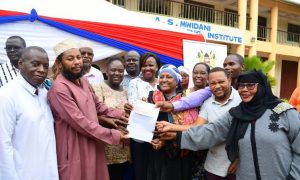The government is committed to investing in irrigation, mechanization and value chain development while fostering partnerships with private sector players and research institutions for the country to be self-sufficient in food production.
Agriculture Principal Secretary Dr. Kipronoh Ronoh noted that Kenya has made strides in boosting food production through key initiatives such as the subsidised fertiliser programme and the national farmer database, which helps identify challenges facing smallholder farmers.
“The Kampala Declaration 2025, a key policy document, sets ambitious targets, including reducing post-harvest losses by 50 per cent and tripling intra-African trade in agri-food products by 2035,” said Dr. Ronoh.
The PS made the remarks at a Nairobi hotel in a speech read on his behalf by the Secretary of Administration in the Ministry of Agriculture and Livestock Development, Rashid Khator, during a graduation ceremony for the Centre for African Leaders in Agriculture (CALA) Cohort 3 delegates of the Alliance for a Green Revolution in Africa (AGRA) leadership programme.
CALA is an Alliance for a Green Revolution in Africa (AGRA)-led leadership programme targeting leaders from public, private and civil society sectors in the food system transformation space in Africa.
Dr. Ronoh called upon the newly graduated leaders to bridge the gap between policy and practice by implementing strategies that empower farmers, youth, and women in agribusiness, as well as to network, collaborate, and drive collective action toward a food-secure future and to champion agricultural transformation across Africa.
The event also celebrated the achievements of professionals from the public, private, and civil society sectors across Africa, who completed AGRA’s 16-month leadership program.
Dr. Ronoh commended AGRA’s efforts in equipping African leaders with the skills needed to transform food systems.
“The journey you have undertaken has been one of learning, transformation, and leadership growth. We count on you to champion climate-smart agriculture, drive technology adoption, advocate for policy reforms, and expand agribusiness,” said the PS.
Dr. Rono said Kenya is grateful that the CALA programme has trained a total of 25 local leaders since its inception, who include officers from the Ministry of Agriculture and Livestock Development in the 16-month programme that equips professionals with leadership skills to address Africa’s food security challenges.
According to the PS, food insecurity remains a pressing issue, with over 61 million people in East Africa affected due to climate change, economic instability and conflicts.
He emphasized the need for climate adaptation strategies, mechanization and youth involvement in agribusiness to build a resilient food system.
As the graduates embark on their next phase, AGRA representatives reaffirmed their support, emphasising that leadership in agriculture is key to achieving economic growth, food security, and sustainability across the continent.
During the event, speakers emphasized the urgent need for climate-smart agriculture, agribusiness expansion, and policy-driven reforms to address food insecurity on the continent.
Ends/agriculture
By Gabriel Mwangi








